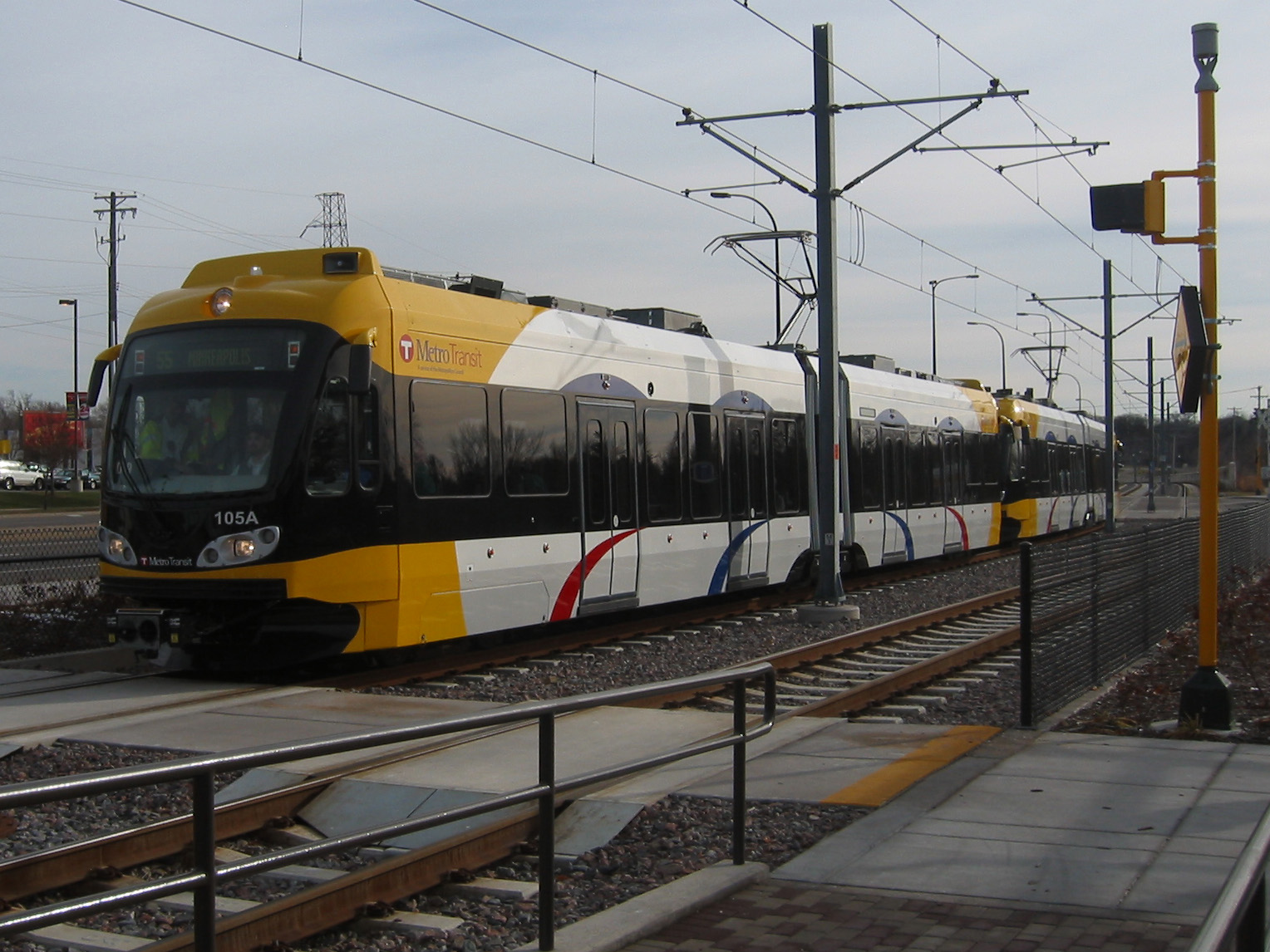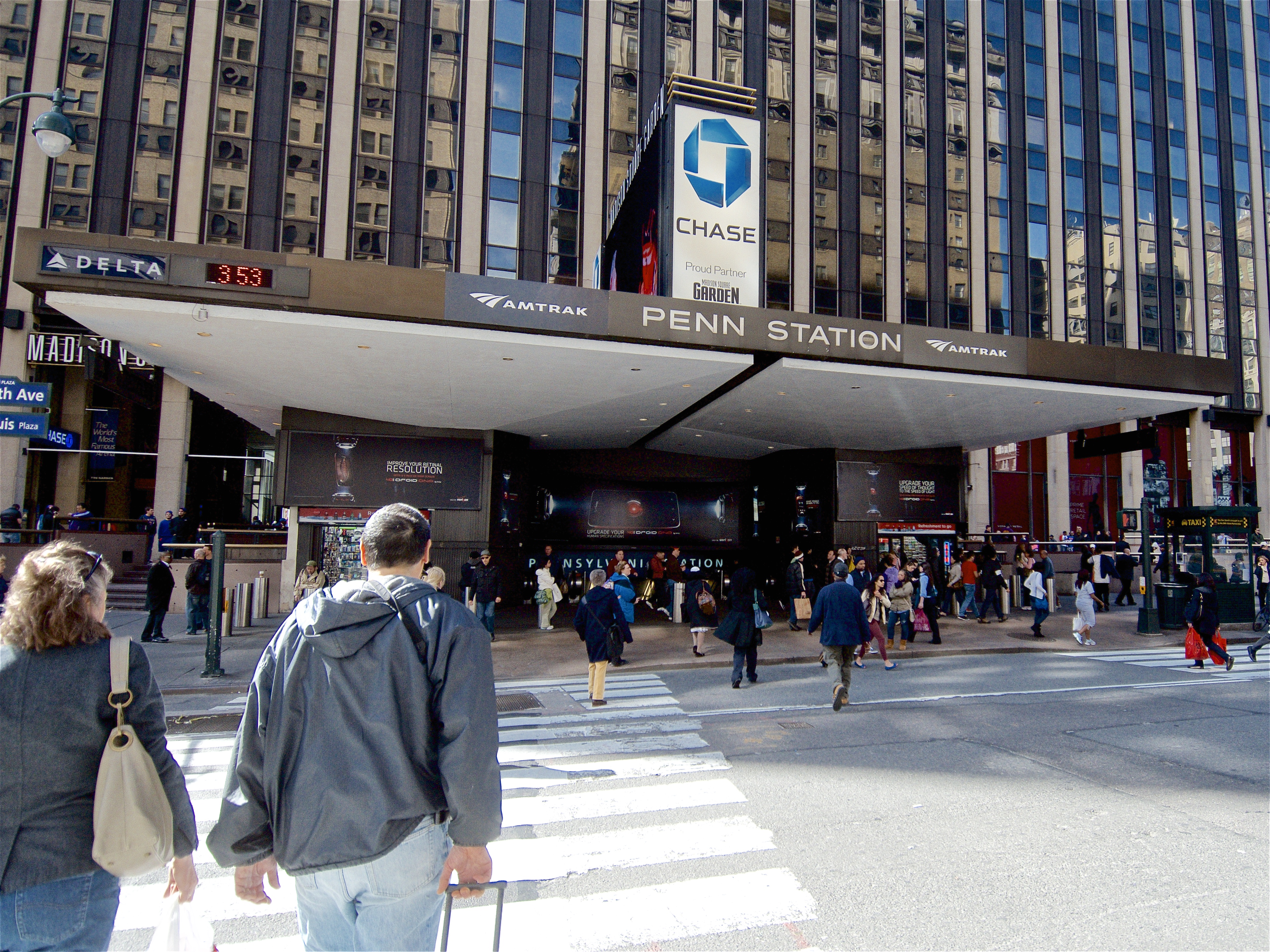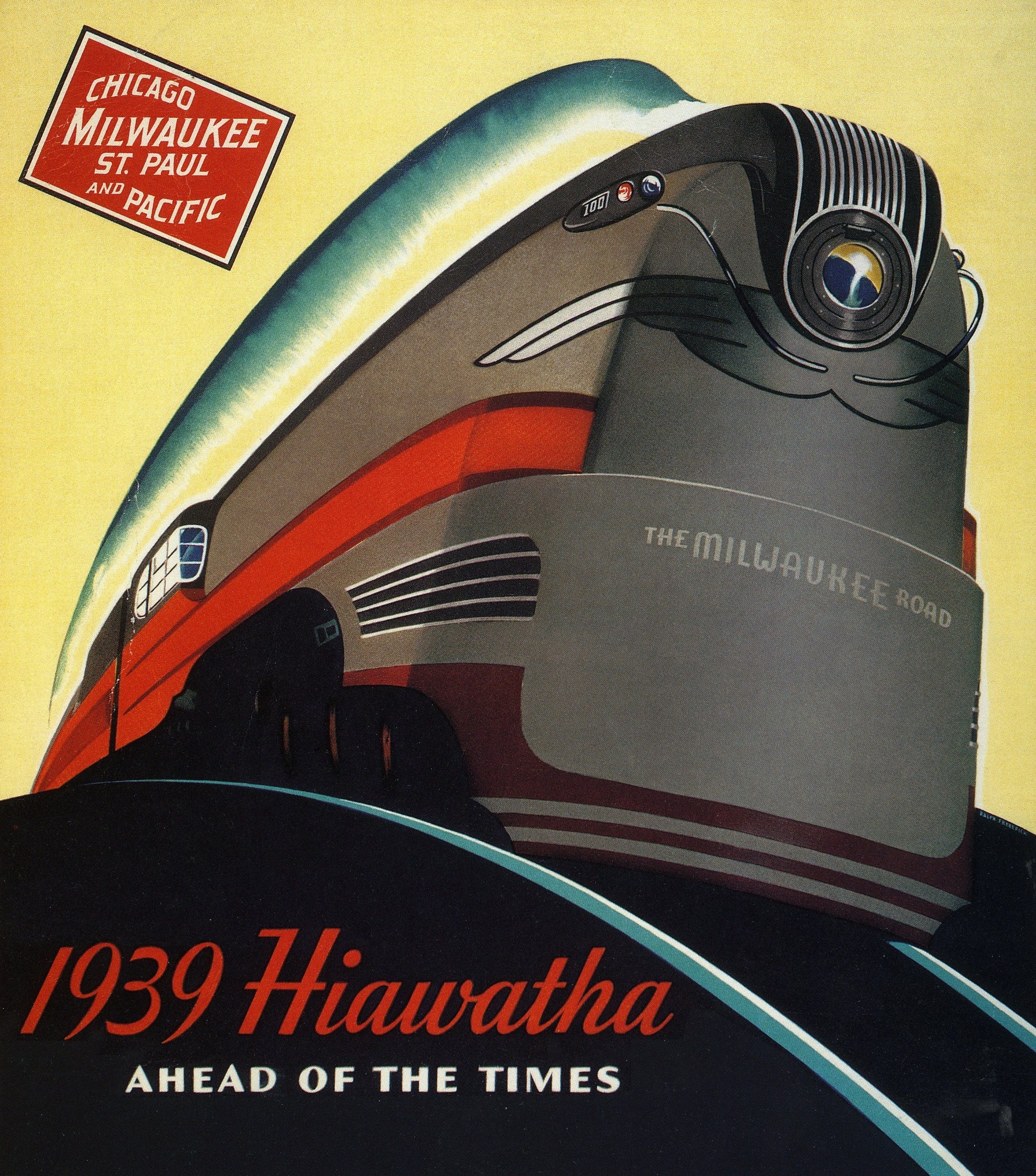|
Metro Blue Line (Minnesota)
The Metro Blue Line is a light rail line in Hennepin County, Minnesota, that is part of the Metro network. It travels from downtown Minneapolis to Minneapolis–Saint Paul International Airport and the southern suburb of Bloomington. Formerly the Hiawatha Line (Route 55) prior to May 2013, the line was originally named after the Milwaukee Road's Hiawatha passenger train and Hiawatha Avenue, reusing infrastructure from the former and running parallel to the latter for a portion of the route. The line opened June 26, 2004, and was the first light rail service in Minnesota. An extension, Bottineau LRT, is planned to open in 2028. The Blue Line is operated by Metro Transit, the primary bus and train operator in the Twin Cities. As of December 2022, the service operates from approximately 3:19am to 12:50am with 15minute headways most of the day. The route averaged 32,928 daily riders in 2019, representing 13 percent of Metro Transit's ridership. The line carried 10.6 milli ... [...More Info...] [...Related Items...] OR: [Wikipedia] [Google] [Baidu] |
Downtown Minneapolis
The Central Minneapolis community is located in the central part of the city, consisting of 6 smaller official neighborhoods, and includes Downtown Minneapolis and the central business district. It also includes the many old flour mills, the Mill District, and other historical and industrial areas of Downtown Minneapolis. It also includes some high-density residential areas surrounding it, excluding areas east of the Mississippi River. Businesses based in the Central area include the corporate headquarters of Target, US Bank, and the broadcast facilities of Minnesota CBS station WCCO-TV. Official neighborhoods in the Central community * Downtown East * Downtown West ''where most of the high-rise office buildings are located'' * Elliot Park * Loring Park * North Loop ''commonly referred to as the Warehouse District'' * Stevens Square/Loring Heights Gallery File:A view of downtown Minneapolis from the Stone Arch Bridge.jpg, View of downtown Minneapolis from the Stone Arch ... [...More Info...] [...Related Items...] OR: [Wikipedia] [Google] [Baidu] |
Hennepin County
Hennepin County ( ) is a county in the U.S. state of Minnesota. Its county seat is Minneapolis, the state's most populous city. The county is named in honor of the 17th-century explorer Father Louis Hennepin. The county extends from Minneapolis to the suburbs and outlying cities in the western part of the county. The county’s natural areas are covered with extensive woods, hills, and lakes. As of the 2020 census, the population was 1,281,565. It is the most populous county in Minnesota, and the 34th-most populous county in the United States; more than one in five Minnesotans live in Hennepin County. Hennepin County is included in the Minneapolis-St. Paul-Bloomington Metropolitan Statistical Area. History The Territorial Legislature of Minnesota established Hennepin County on March 6, 1852, and two years later Minneapolis was named the county seat. Father Louis Hennepin's name was chosen because he originally named Saint Anthony Falls and recorded some of the earlies ... [...More Info...] [...Related Items...] OR: [Wikipedia] [Google] [Baidu] |
Lake Street (Minneapolis)
Lake Street is a major east-west thoroughfare between 29th and 31st streets in Minneapolis, Minnesota United States. From its western most end at the city's limits, Lake Street reaches the Chain of Lakes, passing over a small channel linking Bde Maka Ska and Lake of the Isles, and at its eastern most end it reaches the Mississippi River. In May 2020, the Lake Street corridor suffered extensive damage during local unrest over the murder of George Floyd. In August of the same year, city officials designated East Lake Street as one of seven cultural districts to promote racial equity, preserve cultural identity, and promote economic growth. Connection to other cities West of the city limits, Lake Street is coextensive with Minnetonka Boulevard running nearly a mile into St. Louis Park and then separates from Minnetonka Boulevard (which continues westward all the way through St. Louis Park) and runs diagonally southwestward. In the Uptown commercial district, the road is one-way a ... [...More Info...] [...Related Items...] OR: [Wikipedia] [Google] [Baidu] |
30th Avenue Station
The 30th Avenue station (formerly 30th Avenue–Grand Avenue station) is a local station on the BMT Astoria Line of the New York City Subway. It is located at 30th Avenue and 31st Street in Astoria. The station is served by the N train at all times, as well as by the W train on weekdays. History This station opened on February 1, 1917, along with the rest of the Astoria Line, which was originally part of the IRT, as a spur off the IRT Queensboro Line, which is now the IRT Flushing Line. Trains ran between Grand Central and Astoria. On July 23, 1917, the Queensboro Bridge spur of the elevated IRT Second Avenue Line opened. At that time, all elevated trains to Queensboro Plaza used the Astoria Line while all subway trains used the IRT Flushing Line, though this was later changed with trains alternating between branches. This station started to be served by BMT shuttles using elevated cars on April 8, 1923. The city government took over the BMT's operations on June 1, 194 ... [...More Info...] [...Related Items...] OR: [Wikipedia] [Google] [Baidu] |
Fort Snelling Station
Fort Snelling station is a light rail station on the Blue Line in the Minneapolis–Saint Paul region of the U.S. state of Minnesota, named after the nearby Fort Snelling historic fort structure. This station is located on Minnehaha Avenue, adjacent to the Bishop Henry Whipple Federal Building and diagonally across from a U.S. Army Reserve campus and the main entrance to an Air National Guard station. The station's layout has a center-platform design. Service began at this station when the Blue Line opened on June 26, 2004. At that time, this was the southern terminus of the Blue Line. The remainder of the line, south of this station, opened on December 4, 2004. This station is the site of a large park and ride facility. There are two parking lots, making a total of about 975 spaces available to commuters. Just north of this station the Blue Line crosses the interchange of Minnesota State Highway 55 and Minnesota State Highway 62 on a flyover. Just south of this station, ... [...More Info...] [...Related Items...] OR: [Wikipedia] [Google] [Baidu] |
Park And Ride
A park and ride, also known as incentive parking or a commuter lot, is a parking lot with public transport connections that allows commuters and other people heading to city centres to leave their vehicles and transfer to a bus, rail system (rapid transit, light rail, or commuter rail), or carpool for the remainder of the journey. The vehicle is left in the parking lot during the day and retrieved when the owner returns. Park and rides are generally located in the suburbs of metropolitan areas or on the outer edges of large cities. A park and ride that only offers parking for meeting a carpool and not connections to public transport may also be called a park and pool. Park and ride is abbreviated as "P+R" on road signs in some countries, and is often styled as "Park & Ride" in marketing. Adoption In Sweden, a tax has been introduced on the benefit of free or cheap parking paid by an employer, if workers would otherwise have to pay. The tax has reduced the number of wor ... [...More Info...] [...Related Items...] OR: [Wikipedia] [Google] [Baidu] |
Transit Center
A transport hub is a place where passengers and cargo are exchanged between vehicles and/or between transport modes. Public transport hubs include railway stations, rapid transit stations, bus stops, tram stops, airports and ferry slips. Freight hubs include classification yards, airports, seaports and truck terminals, or combinations of these. For private transport by car, the parking lot functions as a unimodal hub. History Historically, an interchange service in the scheduled passenger air transport industry involved a "through plane" flight operated by two or more airlines where a single aircraft was used with the individual airlines operating it with their own flight crews on their respective portions of a direct, no-change-of-plane multi-stop flight. In the U.S., a number of air carriers including Alaska Airlines, American Airlines, Braniff International Airways, Continental Airlines, Delta Air Lines, Eastern Airlines, Frontier Airlines (1950-1986), Hughes Airwes ... [...More Info...] [...Related Items...] OR: [Wikipedia] [Google] [Baidu] |
South Minneapolis
The U.S. city of Minneapolis is officially defined by the Minneapolis City Council as divided into eleven communities, each containing multiple official neighborhoods. Informally, there are city areas with colloquial labels. Residents may also group themselves by their city street suffixes, North, Northeast, South, Southeast, and Southwest. Description General areas The local community defines several general areas based on the directional suffixes added to streets in the city. These city areas do not necessarily correlate with official community or neighborhood definitions. Downtown Minneapolis refers to the street grid area aligned on a diagonal with the Mississippi River bend, as opposed to the true north-south grid orientation. The area north of downtown on the west bank of the Mississippi River is considered North Minneapolis. The part of Minneapolis on the east bank of the Mississippi River is divided by East Hennepin Avenue into Northeast and Southeast, approximat ... [...More Info...] [...Related Items...] OR: [Wikipedia] [Google] [Baidu] |
Headway
Headway is the distance or duration between vehicles in a transit system measured in space or time. The ''minimum headway'' is the shortest such distance or time achievable by a system without a reduction in the speed of vehicles. The precise definition varies depending on the application, but it is most commonly measured as the distance from the tip (front end) of one vehicle to the tip of the next one behind it. It can be expressed as the distance between vehicles, or as time it will take for the trailing vehicle to cover that distance. A "shorter" headway signifies closer spacing between the vehicles. Airplanes operate with headways measured in hours or days, freight trains and commuter rail systems might have headways measured in parts of an hour, metro and light rail systems operate with headways on the order of 90 seconds to 20 minutes, and vehicles on a freeway can have as little as 2 seconds headway between them. Headway is a key input in calculating the overall route cap ... [...More Info...] [...Related Items...] OR: [Wikipedia] [Google] [Baidu] |
Bottineau LRT
The Bottineau LRT ( Metro Blue Line Extension) is a proposed light rail line extension in the Minneapolis – Saint Paul Metro area, projected to run northwest from Target Field station in downtown Minneapolis along County Road 81 to Brooklyn Park. The selected alignment was initially planned to run adjacent to a BNSF freight line, but opposition from the company has forced the project to be redesigned with a new routing. Alignment alternatives The Bottineau Transitway Alternative Analysis Study, released in 2009, outlined several different alternatives for both the northern and southern ends of the corridor. In 2010, the final AA report recommended the A-D1 light rail alignment as the best option, but also suggested B-D1, A-D2 and B-D2 should continue to be studied. A-D1 and B-D1 were also recommended for continued study as possible bus rapid transit alignments. Northern alternatives There are two northern alternatives: Alternative A begins in Maple Grove and runs alo ... [...More Info...] [...Related Items...] OR: [Wikipedia] [Google] [Baidu] |
Hiawatha Avenue
Minnesota State Highway 55 (MN 55) is a highway in west-central, central, and east-central Minnesota, which runs from the North Dakota state line near Tenney and continues east and southeast to its eastern terminus at its intersection with U.S. Highway 61 in Hastings. This route, signed east–west, runs roughly diagonally across the central part of Minnesota. Highway 55 is in length. Route description Highway 55 serves as a northwest–southeast route between Elbow Lake, Glenwood, Paynesville, Annandale, Buffalo, Plymouth, Minneapolis, Mendota Heights, and Hastings. Highway 55 begins at the Bois de Sioux River, at the Minnesota — North Dakota state line near Tenney. North Dakota Highway 11 is its counterpoint upon crossing the state line. Highway 55 continues east to Tenney, Nashua, and Wendell. The route has a junction with U.S. Highway 59 before entering the city of Elbow Lake. Highways 55 and 59 run concurrently for 11 miles until reaching Barre ... [...More Info...] [...Related Items...] OR: [Wikipedia] [Google] [Baidu] |
Hiawatha (train)
The ''Hiawathas'' were a fleet of named passenger trains operated by the Chicago, Milwaukee, St. Paul and Pacific Railroad (also known as the Milwaukee Road) between Chicago and various destinations in the Midwest and Western United States. The most notable of these trains was the original ''Twin Cities Hiawatha'', which served the Twin Cities in Minnesota. The train was named for the epic poem ''The Song of Hiawatha'' by Henry Wadsworth Longfellow. History The first ''Hiawatha'' trains ran in 1935. By 1948, five routes carried the ''Hiawatha'' name: *The ''Twin Cities Hiawatha'' — the main line route from Chicago through Milwaukee to St. Paul and Minneapolis, in ''Morning'' and ''Afternoon'' editions *The ''North Woods Hiawatha'' — a spur route off the Chicago-Minnesota main line leading from New Lisbon to Minocqua, Wisconsin *The ''Chippewa-Hiawatha'' — connected Chicago to Ontonagon in Michigan's Upper Peninsula via Milwaukee and Green Bay, Wisconsin * ... [...More Info...] [...Related Items...] OR: [Wikipedia] [Google] [Baidu] |





